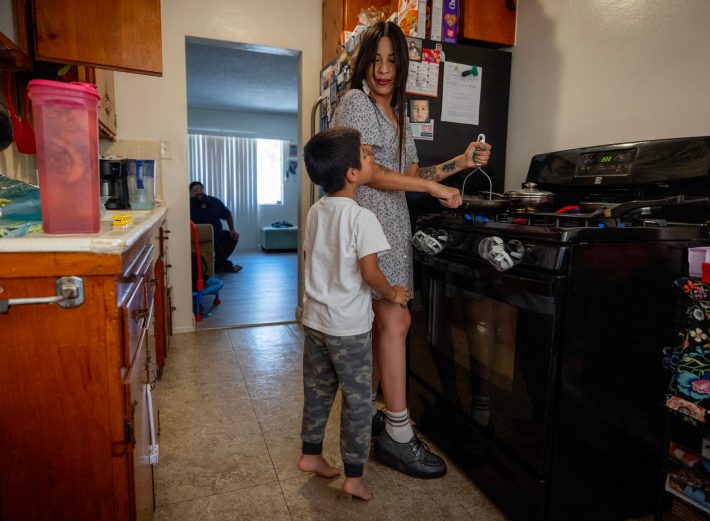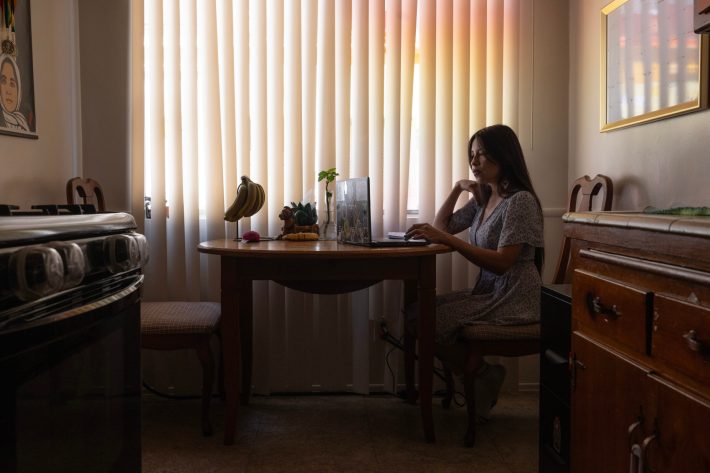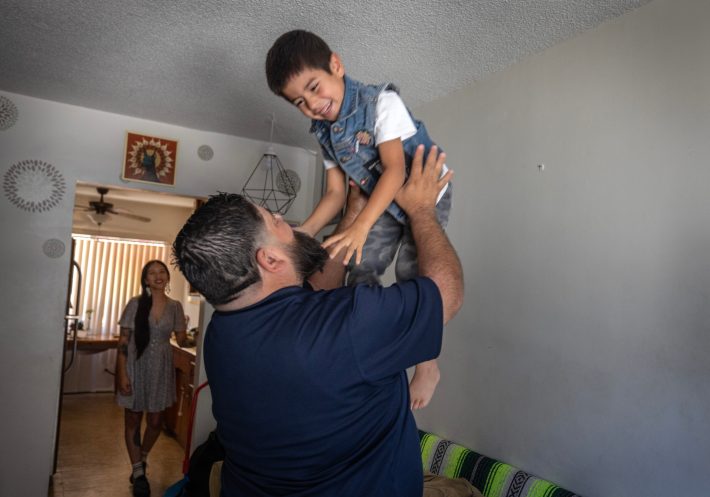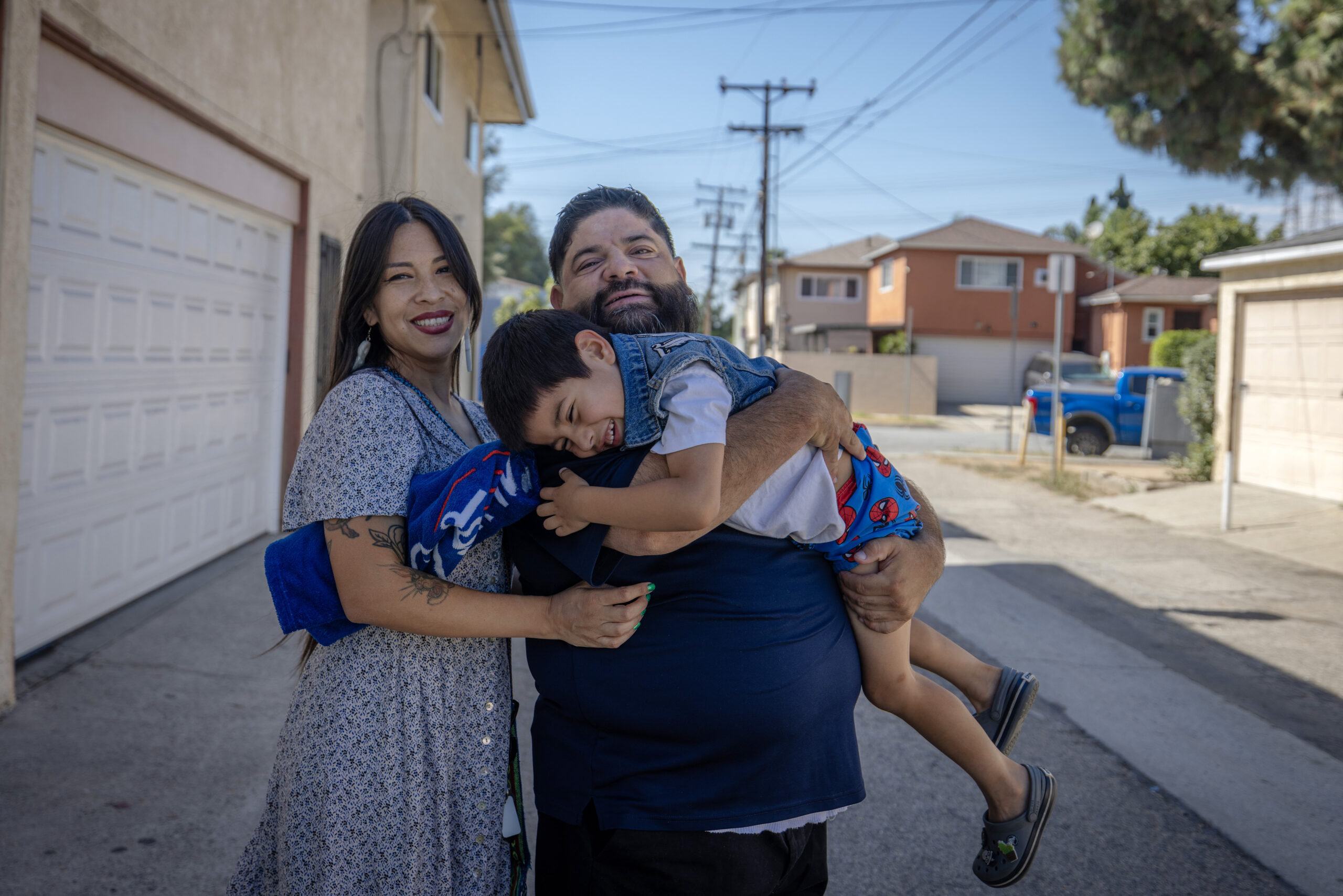This article was produced by Capital & Main, an award-winning publication covering politics and California culture. It is co-published with permission.
Belen Hernandez hit rock bottom in her early 30s. Down and out in the Boyle Heights neighborhood of Los Angeles, Hernandez and her partner, Henry Verdin, both drug addicts, were living hand to mouth when a family member located them under a bridge where they were staying. It was 2017.
The family member, Salvador “Chava” Thomas, “helped us get sober,” Hernandez said, but it was a long road ahead. Once they got clean, she and Verdin were ready to go to work in the movie security industry — in minimum wage jobs. But Hernandez had to quit after her newborn son began demonstrating developmental delays and was diagnosed with autism.
The pressure began to ratchet up. “I felt so lost,” Hernandez said in a phone interview.
Help was about to arrive in a way she couldn’t have predicted.
At the suggestion of a friend whose job involved finding housing for unsheltered people, Hernandez got in touch with the Los Angeles office of LIFT, a national nonprofit whose approach to elevating families out of low-income subsistence cycles looks and feels different.

At LIFT, Hernandez was paired with a life coach and taught the basics of building financial stability. Even while trying to stay afloat from week to week, she was encouraged to think and talk about longer-term goals — and to speak some of those dreams aloud. After a couple of years of mentorship and stabilizing her family’s finances, she participated in a LIFT-organized community business academy to learn how to create and run a small company.
Today, Hernandez and Verdin, now her fiancé, remain in the film production security business — only now they are the owners of their firm, rather than hourly workers.
“My god, it was so helpful,” Hernandez said of LIFT, in which she still participates. “I really needed some guidance, especially back at the beginning as a new mom and with my partner working more hours than ever. The program has made all the difference.”
Total cost to Hernandez and her family: sweat equity.
* * *
There are almost as many approaches to fighting poverty and low-income life as there are ways that people and families fall into that life. Some programs try to fend off homelessness before it starts via significant infusions of cash. Government programs may focus on the early learning or nutritional needs of kids, among other targeted areas.
LIFT, headquartered in Washington, D.C., comes from a different angle. It does provide money, but only enough to make a small difference in most participants’ lives—roughly $150 per quarter over a two-year period, or about $1,200 total. Education and encouragement toward a self-sustaining life are the larger pieces of the pie.
“It’s about the cash, but it’s not just about the cash,” said Michelle Rhone-Collins, LIFT’s chief executive. “It really is about the need for thinking about the development and holistic support needed to leverage those dollars—about your goals and aspirations, and the financial realities needed to reach them.”

LIFT’s specialty is close, one-on-one advice and mentorship. Its life coaches often lock into years-long relationships with the program’s participants, such as Hernandez, who said she still relishes her monthly check-ins. Her coach, she said, helped her shape the goals that Hernandez and Verdin had for the security firm, then helped with foundational pieces like getting a license, filling out the proper forms to carry employees, and applying for small business loans.
From its inception in 1998 as an organization trying to help people of any age, LIFT has narrowed its focus to parents with young children – essentially trying to positively affect two generations at once. While it once relied heavily on college student volunteers, it has grown into a more professional operation.
“For young families, what is needed to get you where you want in your career, get off the volatility of minimum wage and long, unstable hours? What do you really want to do?” Rhone-Collins said. “The point is to move you up the ladder, to living wage and then beyond.”
* * *
At its core, LIFT focuses on financial, employment and educational coaching, all of it offered at no charge. With offices in Chicago and New York in addition to Washington, D.C. and Los Angeles, it will work with more than 900 families this year, about 350 of them in the L.A. area.
Rhone-Collins said that by partnering with “other system players” and teaching them how to deliver economic mobility coaching, LIFT’s program reaches another 7,000 families nationally. It has a contract with the national children’s support program Head Start to serve as its economic mobility expert.
By the organization’s accounting, the results of the work are real enough: More than 90% of the families LIFT serves see financial improvement, increasing their income by an average of about $20,000 a year. Ninety-nine percent of participants are people of color; 93% are women.

And LIFT’s services are offered not only in their own offices, but also at community colleges, early childhood centers and doctors’ offices. Those are the locales from which the majority of participants learn about the existence of the program. (In Los Angeles, LIFT’s office is located within the Magnolia Place Family Center in the Pico-Union neighborhood.)
For Belen Hernandez, being told by a friend about LIFT was a game-changer. She’d never heard of the program — not uncommon for a smaller nonprofit — but knew that she needed some guidance to figure out household finances and make a plan for the future. She got all that, and more — and years later, she’s still all in.
“I just had my [monthly] call yesterday with my coach,” Hernandez said. “That still helps me set the tone for what I’m doing and where we’re going.”
Copyright 2024 Capital & Main.
All photos by Barbara Davidson.






